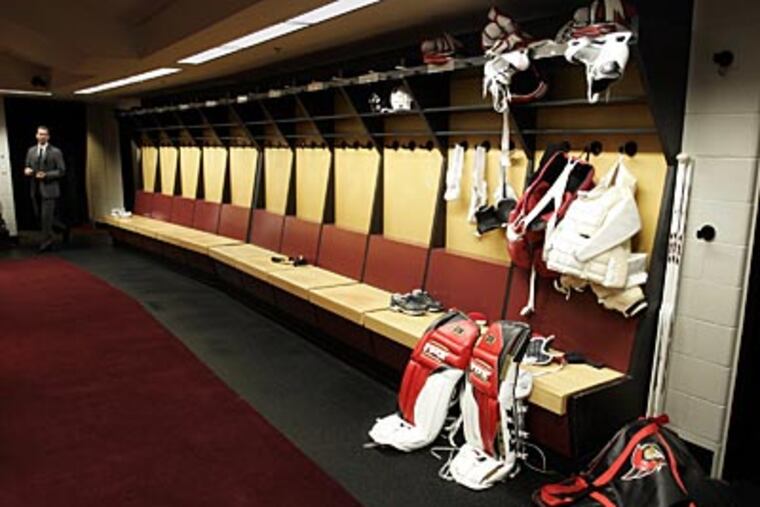Sam Donnellon: NHL owners locking out lots of momentum
THIS TIME, the players need to stay out, and out, and out. Kill this season, kill the next season if they have to, start their own hockey league and maybe their own fledgling sports network, too, if this owner insanity continues.

THIS TIME, the players need to stay out, and out, and out. Kill this season, kill the next season if they have to, start their own hockey league and maybe their own fledgling sports network, too, if this owner insanity continues.
You're angry. I'm angry. We're all angry. The columnist thing to do is to call everyone involved in the NHL's latest labor dispute greedy, maybe present a disingenuous argument about the fans not coming back this time, then tell them all to call me when they're done.
Well, not this time. Greed on both sides is not the big problem.
Greed on one side is.
The owners locked the players out in 2004-05 until they bent way over. Owners offered 57 percent of what was then about a $2.2 billion revenue pot for the most envied cost-containment mechanism of the time: a hard cap to which each team must adhere or pay prohibitive fines.
At the time, the NHL cap was the envy of all leagues. Commissioner Gary Bettman and the owners he represented argued that such a cap would grow the game, and damned if they weren't right.
Too right, it would seem now. Today, the NHL is a league with only one team, the Columbus Blue Jackets, in deep financial distress. A league that, despite the ill will created with its fans back in 2005, has set attendance marks and landed a big television contract with media-giant Comcast, owners of all things NBC.
In the 7 years since that lockout, NHL revenues have increased by more than $1 billion to a record $3.3 billion last year, due in part to the smart marketing of its stars and the genuine enthusiasm of those players to grow the game through various out-of-the-box attention ploys. The Winter Classic. HBO's much-acclaimed "24/7" series. And the continued willingness of most stars to play in a grueling 2-week international tournament every 4 years have all contributed to obtaining that 10-year, $1.8 billion television deal with Comcast/NBC in April 2011.
When the deal was struck, NBC programming chief Jon Miller called the NHL "our most important property." For once, the NHL felt respected by a network partner. The new network, seeking to compete against ESPN, had some skin in the game, too. It was the best of times, eh?
Ah, but with each pile of cash added to the league's balance sheet, that 57 percent players received became more annoying to owners than Claude Lemieux ever was to Flyers fans. Impossible, you say? How else to explain their willingness to stop momentum better than the trap ever did, just to get closer to those 50-50 deals that the NFL and NBA have struck since the NHL's last collective-bargaining agreement in 2005?
At this point, I would like to borrow comedian Lewis Black's voice to point something out:
YOU ARE NOT THE (EXPLETIVE) NBA OR THE NFL!!!
There. I feel much better.
Those are still the big-boy leagues. You are not there yet. But finally, with a big-muscled network partner, you were at least skating clockwise.
What's torturous to watch is all that momentum screeching to a halt because of this misguided comparison. For years, NHL players have bought into the "playing for the sweater" mentality in a way players from those other leagues have not. They play 82 brutal games before they even get to the postseason, hide all kinds of hurts to play, even those that threaten their quality of life afterward.
The players' acceptance of a hard cap is at least part of the reason small-market teams have survived and in some cases prospered. Canada has actually gained a team (Winnipeg) over that stretch. Places where fandom needed to be built or rebuilt have experienced exciting Cup runs. With a Stanley Cup champion, Los Angeles hasn't been this excited about hockey since Wayne Gretzky played there.
Right before they locked them out, NHL owners issued a proposal that would have effectively reduced the players' percentage from 57 to 49 at the start, eventually whittling it to 47. That's up from their original stance of 43 percent, but still a bitter, puck-sized pill to swallow.
And such unnecessary medicine as well.
So, no, I will not be calling each side greedy this time around. It's one thing to change a losing formula. But to mess with this kind of momentum, a fourth work-stoppage in 20 years, is just so shortsighted, even for a league that once walked away from ESPN to gain a few more dollars with a defunct network called SportsChannel America.
They did so, as I recall, because they felt disrespected by ESPN. I would argue they are doing the same thing to their own now, guys we've learned to know and like over the last 7 productive years.
Many, by the way, with the kind of big personalities that those big-boy leagues covet in a big way.